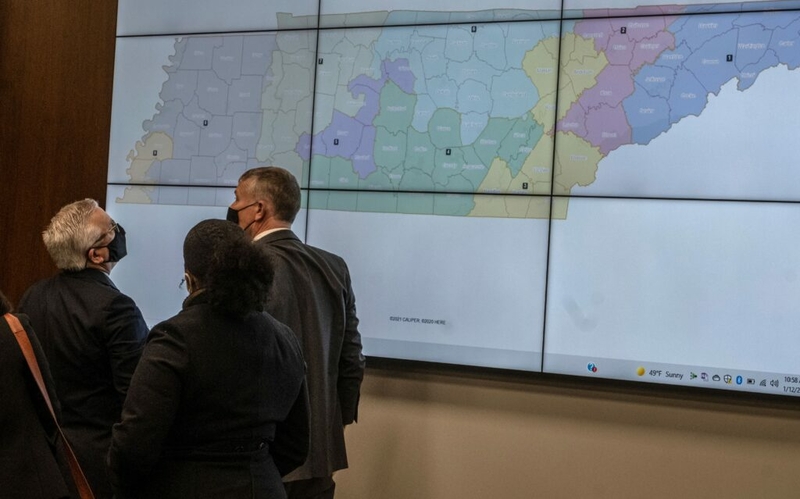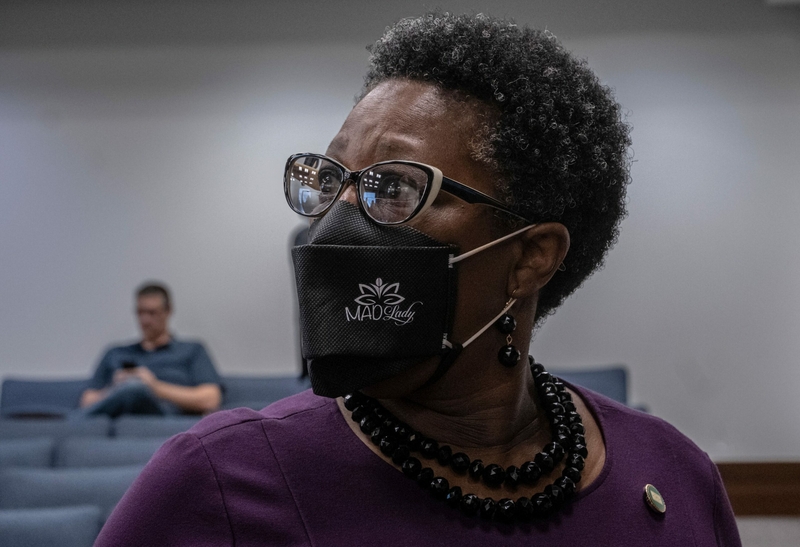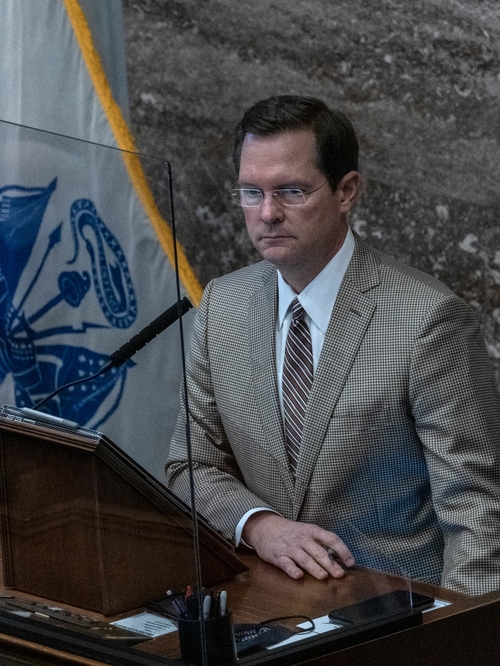House redistricting panel splits Davidson congressional map three ways

Snickers and gasps filled a House meeting room Wednesday when Republicans revealed a congressional redistricting map that splits Davidson County three ways.
Most onlookers knew what was coming, but they were still shocked when they saw it.
Democratic state Rep. Antonio Parkinson of Memphis summed it up best: “When this map was unveiled you could hear the air suck out of the room.”
The plan is to be voted on again Wednesday by the House Public Service Committee.
Parkinson, who voted against the map along with Democratic colleagues on the House ad hoc redistricting committee, called it a “vicious map,” saying controlling Republicans left “no stone unturned to give a hundred-year advantage to the majority party.”
Parkinson and Rep. Bob Freeman, a Nashville Democrat, both questioned the potential “dilution” of minority residents in Davidson County, and House Minority Leader Karen Camper pointed out the map also does a disservice to voters in Memphis and Shelby County where the 9th Congressional District represented by Democratic U.S. Rep. Steve Cohen will go north to take in Tipton County and cut out some parts of inner Shelby County.

The 5th District, represented by longtime Democratic U.S. Rep. Jim Cooper, will take in southern and easternmost Davidson County, western and central Wilson County, eastern Williamson County and all of Maury, Marshall and Lewis counties.
With a population of 767,781, 70.8% of its voters will be white, 11.9% Black, 4.25% Asian and 10.3% Hispanic. That means 5th would not be a minority majority district or an opportunity district in which a minority could swing the vote.
The 6th Congressional District, represented by Republican U.S. Rep. John Rose, will take in an eastern part of Davidson County, in addition to all of Sumner County and the northern and eastern parts of Wilson, as well as several counties in upper Middle Tennessee to the Cumberland Plateau.
It would have a population of 767,972, 79.1% white voters, 9% Black, 1.1% Asian and 7.7% Hispanic.
The 7th Congressional District, represented by Republican U.S. Rep. Mark Green of Ashland City, will take in central, northern and western Davidson County, western Williamson County and most of the rural counties in Middle Tennessee east of the Tennessee River.
The new 7th would have 767,871 residents, 71% white, 16% Black, 2% Asian and 7.4% Hispanic.
Republican lawmakers in charge of the committee allowed two other maps to be presented but gave them no consideration. Democrats also failed to call for a vote on their own plan.
After Speaker Pro Tem Pat Marsh introduced the Republican plan, Camper, a Memphis Democrat, tried to stop the vote but to no avail.

Camper concurred with Parkinson’s assessment that the plan is “vicious,” saying, “I think we need to keep this map in this committee and have a deeper conversation.”
House Majority Leader William Lamberth, however, argued that the process has been going on for months and “robust debate” will continue as it goes through the committee system.
“To stonewall the process at this juncture, it would be premature to cut off debate,” said Lamberth, a Portland Republican.
Parkinson also argued that he and Democratic members of the committee hadn’t seen the map until it was presented Wednesday. But Deputy Speaker Curtis Johnson, chairman of the committee, forged ahead with the vote.
Republicans on the committee went out a side door after the meeting and did not answer questions.
For months, Democrats raised concerns that Republicans would break Davidson County into pieces in an effort to elect a Republican, giving the state eight Republicans and only one Democrat instead of two.
House Speaker Cameron Sexton, though, said this week the proposed map is not a political move. He argued that district lines don’t determine whether a Democrat or Republican is elected.
There is no way to say the needs of Lewis County are being well-represented by leaking it into Davidson County and vice-versa.
The Senate congressional plan, which is to be shown Thursday in a redistricting committee meeting, is similar to the House plan and is expected to receive approval.
Sen. Heidi Campbell, who serves on the Senate panel, predicted communities would lose representation and minorities would lose access to the political process under this proposal. Democrats argued that their proposal would keep communities with the same interests in the same congressional districts.
“Rigging a map by dividing a community like Nashville will deny Davidson County voters a congressional representative who is solely focused on local issues. And it also denies suburban and rural counties an elected official who is focused on their community’s concerns,” said Campbell, a Nashville Democrat.
The League of Women Voters presented a map in concert with other groups, one that would keep Davidson County whole.
Debbie Gould, president of the Tennessee League of Women Voters, called the proposed map a “real disservice to the people of Davidson County to lose their representation that way.
“There is no way to say the needs of Lewis County are being well-represented by leaking it into Davidson County and vice-versa,” Gould said.
Odessa Kelly, who is running against Cooper in the current 5th Congressional District, bashed the plan, accusing the committee of introducing a “new era of Jim Crow.”
“They did this just to dilute the voices of black and brown. They did this to kill democracy, to make sure there is no progressive thought that can move forward,” Kelly said.








